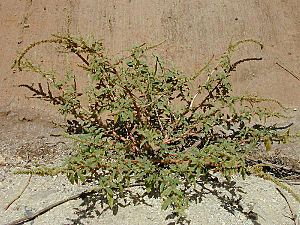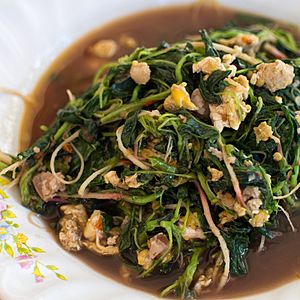Spiny amaranth facts for kids
Quick facts for kids Spiny amaranth |
|
|---|---|
 |
|
| Scientific classification |
|
| Kingdom: | Plantae |
| Clade: | Tracheophytes |
| Clade: | Angiosperms |
| Clade: | Eudicots |
| Order: | Caryophyllales |
| Family: | Amaranthaceae |
| Genus: | Amaranthus |
| Species: |
A. spinosus
|
| Binomial name | |
| Amaranthus spinosus |
|
| Script error: The function "autoWithCaption" does not exist. | |
Script error: No such module "Check for conflicting parameters".
Amaranthus spinosus, also known as spiny amaranth, is a plant with a few different names. People also call it spiny pigweed or prickly amaranth. This plant first grew in warm parts of the Americas. Now, you can find it on almost every continent. Sometimes, it grows where it's not wanted, like a weed. It can be a big problem for rice farms in Asia.
What Amaranth Is Used For
Used as a Dye
In the Khmer language, this plant is called pti banlar. In Vietnamese, it is known as giền. Long ago, people used the ash from this plant. They made a grey dye from it to color cloth.
Used as Food
Many people in Africa eat A. spinosus. It is a valuable food plant there. It is also important in Thai cuisine, where it is called phak khom (Thai: ผักขม). In Tamil, it is known as mullik keerai. In Sanskrit, its name is tanduliyaka.
In the Philippines, people call it kulitis and eat it. The leaves of this plant are called massaagu in the Maldivian language. For hundreds of years, people in the Maldives have used them in dishes. One famous dish is mas huni. In Mexico, it is one of the plants called Quelite quintonil in markets.
In Bangladesh, it is known as "Katanote (কাটানটে)". In Manipuri, it is called "Chengkrook". People use it in stir-fries and soups with other vegetables. In Mauritius, it is called "Brède malbar". Many songbirds also eat the seeds from this plant.
Used in Traditional Medicine
In Traditional medicine in India, people use the ash from the fruits of Amaranthus spinosus. They use it to help with jaundice. In Vietnam, people have used water from its roots and leaves. They use it as a diuretic, which helps the body get rid of extra water.
See also
 In Spanish: Atacú del Perú para niños
In Spanish: Atacú del Perú para niños
 | Claudette Colvin |
 | Myrlie Evers-Williams |
 | Alberta Odell Jones |


